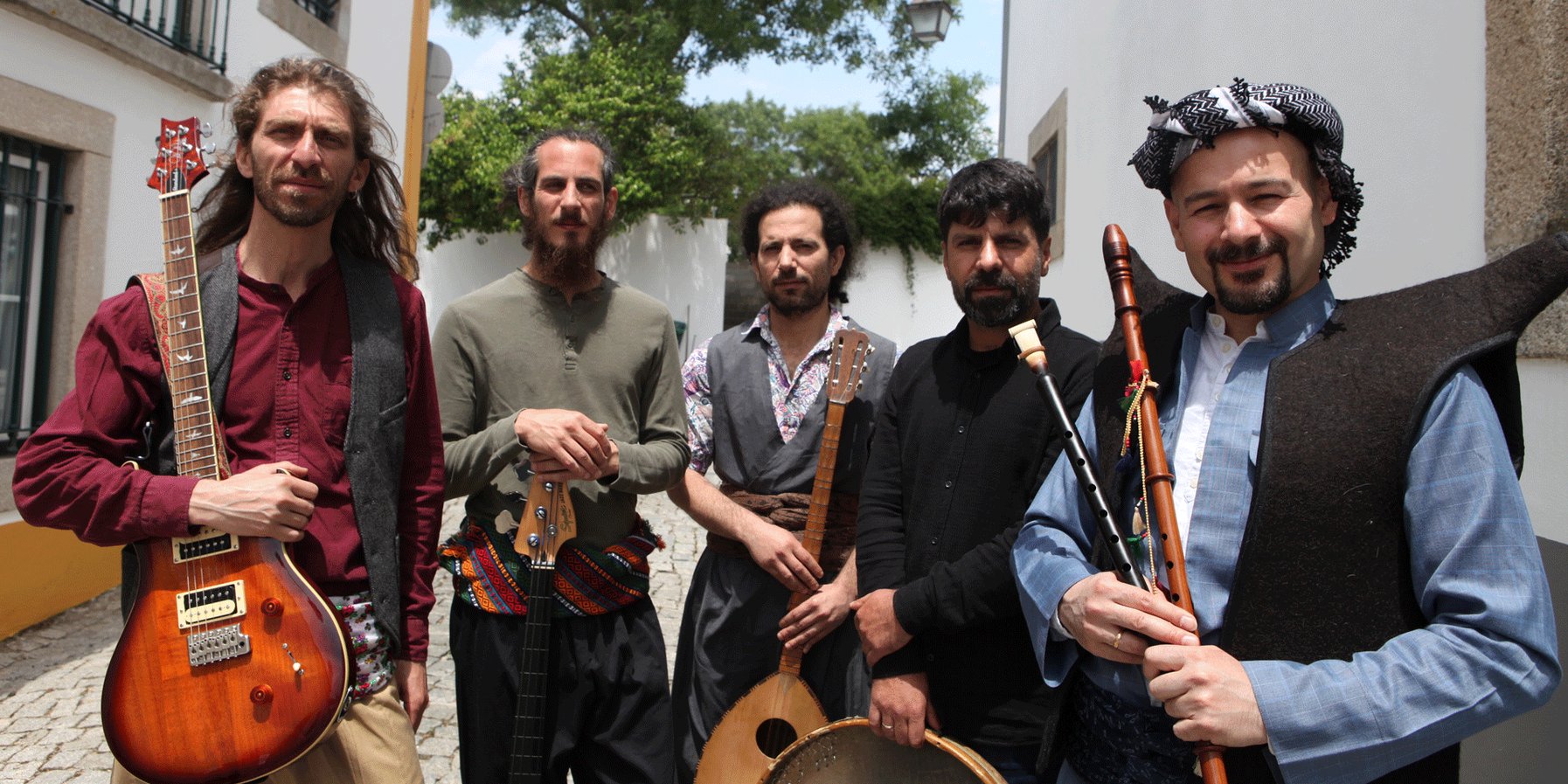For their debut album, the five members of Danûk devote themselves to newly discovered recordings of Kurdish songs dating from the early 20th century. They call their project »Morîk« – meaning »Pearls« in English. »They’re treasures hidden and lost in a deep, dark ocean of oblivion,« they say. In November 2023 they will perform this phenomenal project in the Elbphilharmonie, as part of the programme for the »Kurdistan« Festival.
-
About Danûk
Danûk is a band formed by middle eastern musicians most of whom are living in exile. Ferhad Feyssal and Hozan Peyal are the founders of the band. They both are childhood friends from the same neighbourhood in Al-Hassaka, Syria. After fleeing the country in 2012, they founded Danûk in Istanbul, together with other kurdish musicians (mey/zorna and daff players) who shared similar upbringing around Kurdish folk music, but found themselves on the other side of the borders in Turkey.
The main aim of the band was to bring joy in times of war and to make music that breaks all borders. The band became quite well known in the Istanbul cultural scene and played in numerous venues. Ten years later, with band members relocating to countries across Europe and with their first debut album released, Danûk has a new configuration, with original members Ferhad Feyssal and Hozan Peyal, who are joined by flamenco guitarist from the Golan Heights, Yazan Ibrahim, Istanbul-based percussionists Tarik Aslan, and wood-wind player Ronas Sheikhmous.

What is the project »Morîk« about?
The title of our debut album is »Morik«, which means »Pearl« in Kurdish. We chose this name as a metaphor for finding a treasure that was hidden and lost in a deep and dark ocean of oblivion. The album is a combination of newly composed music for 100-year-old recordings on wax-cylinders we found in museum archives, and re-interpretations of traditional kurdish wedding songs. These ancient songs are our pearls.
How did the research for this project work?
In 2018, Ferhad Feyssal asked his wife Maria del Mar, who was at the time studying for her master's, to search for academic publications on Kurdish music in the University database. They found a few articles, one of which mentioned songs in Kurdish recorded in the early 1900s on wax cylinders that were stored in museum archives in Vienna and Berlin. These recordings were made in 1902 by anthropologist Felix von Luschan, director of the Berlin Ethnographic Museum, who recorded these songs during an expedition to the Sendshirli excavations (present-day Turkey), and in 1912 by Dr. Gustav Klameth, a German theology student, who recorded a Syrian priest performing three Kurdish songs in a Jerusalem church.
The academic articles did not mention what these songs were about which sparked Ferhads and Marias curiosity: Were these songs well-known folk songs that are sung and performed today? Or could it be that these songs had disappeared and this could be a chance to recover this lost heritage? Maria travelled to Vienna where she went to the Phonograph archive in person to ask about Dr. Gustav Klameth's recordings. The archive staff found the old recordings and digitalized them. The museum archive in Berlin also sent digitalized versions of the recordings made by Von Luschan.

The songs had a distinct background noise from the phonograph (This background noise was reinterpreted with the sound of shaking a metal ring over the vocals of Axir Zemana.) Ferhad transcribed the lyrics and met with Danûk in the Netherlands to compose music for the songs. The recording of the newly arranged songs took place in the summer of 2021 in Michael League's studio, outside Barcelona.
phonograh recordings for »Morîk«: audio samples
With special thanks to the Berlin Phonogramm-Archiv (Source: Collection Luschan Vorderasien, VII W 4550/5552/4556, Phonogramm-Archiv des Ethnologischen Museums - PK)
Do you think music has its own time or is music timeless?
We feel that music is timeless but that there is space for reinterpretation and creativity to make it relevant to the current times. As for the wax cylinder songs, we feel that we are closing a century-old circle by reclaiming access to the recordings that European explorers made in our homeland and stored in museum archives in Europe. War made us flee our country and travel to Europe, so it's empowering to access and bring back to life tiny bits of heritage that would have otherwise been forgotten in time. We wonder if these European explorers would have ever imagined that, in 100 years' time, a group of musicians would search for their recordings to make and album.
Do you think it is important as an artist to see yourself in a tradition?
The war in our homeland is putting our culture in danger of extinction. As Kurds, our songs and traditions are passed on orally and the current mass displacement of youth and artists is breaking the natural oral transmission chain. Therefore, we consider that recovering, documenting, and disseminating our traditions and heritage is more important than ever.
What is your mission as an artist?
We want listeners of our music to experience something new, perhaps experience the sounds of a culture and nation that they were not aware of before. We also feel that there is so much negative news coming from our region. We want to challenge this narrative and show that there is much more depth and complexity than the picture shown in the media. We don't believe in political wars, the only thing we fight for is the survival of our culture.
Interview: Julika von Werder, June 2023




